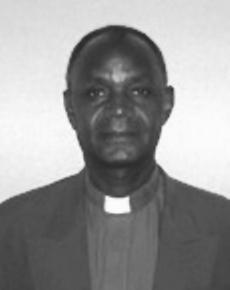
By Celine Klosterman
In the village of Mabilion, Tanzania, people suffering from illnesses or injuries walk more than eight hours to reach the nearest medical clinic, according to Father Mansuetus Setonga. Partly because of the distance, many villagers die each year after going untreated for malaria, tuberculosis, pregnancy complications and other afflictions.
So the priest is seeking donations of money and medical supplies for a clinic to be built in the village. A former chancellor for the Diocese of Same, Tanzania, and a Ph.D. student in economic development at the University of Iowa, he’s speaking at a few parishes in the Diocese of Davenport this summer to raise awareness of the need.
Fr. Setonga hopes to raise $35,000, the cost of building a simple clinic, before he returns to Tanzania in January for a year to help build the facility. It will serve the 5,000 residents of Mabilion and additional Tanzanians in villages nearby.
The facility will include a doctor’s examination room, a room for five female inpatients, a room for five male inpatients and a room for outpatients, Fr. Setonga said. A mobile clinic will transport patients who cannot walk from nearby villages.
The Diocese of Same will oversee the building of the clinic, but Mabilion residents will supply unskilled labor, as well as stones and some other building materials. “For us this is important because we want people to feel that it’s their clinic,” Fr. Setonga said. “If we come and do everything for them, they will not see their ownership.”
Once construction is completed, Tanzanian government will provide medical staffers and pay their salaries, Fr. Setonga said.
Outside Mabilion, the Diocese of Same has built 12 clinics and a larger health center. “Health is part of our diocese’s ministry,” the priest said. “We are following the example of Jesus, who went from village to village curing the sick.”
In about 150 villages, the Diocese of Same also has trained health workers who can provide first aid and educate fellow Tanzanians on basic hygiene. Those workers teach area residents the importance of washing their hands, building toilets and boiling drinking water, which villagers may fetch from contaminated rivers or streams.
To prevent health problems, the diocese also works to distribute mosquito nets and immunize children against measles and other illnesses. The percentage of 1-year-old Tanzanians vaccinated for protection against various diseases ranged from 85 percent to 93 percent in 2009, according to UNICEF, but the diocese wants to immunize more children, Fr. Setonga said.
To donate money or medical supplies for the clinic, contact Fr. Setonga at mlao2@yahoo.com or (319) 936-0642.
Tanzania profile
Population: 43,739,000
Life expectancy: women, 58; men, 53
People living on less than $1 a day: 58 percent
Prevalence of tuberculosis (per 100,000 people): 170
Access to clean water within 30 minutes: urban, 68 percent; rural, 28 percent
Infant mortality rate: 68 per 1,000
Stunting (malnutrition) among children younger than 5: 44 percent
Source: World Health Organization








